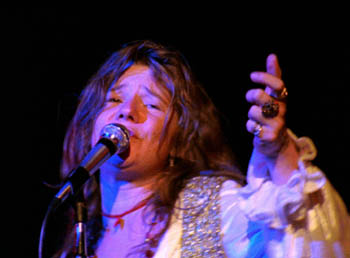![[Metroactive Movies]](/movies/gifs/movies468.gif)
[ Movies Index | Show Times | Silicon Valley | Metroactive Home | Archives ]
Riding High
Joplin, the Dead and more take the electric Canadian Club test in 'Festival Express'
By Richard von Busack
THE FOOTAGE that director Bob Smeaton has assembled into Festival Express is previously unseen material, freed after 25 years in rights-clearance purgatory. Unfortunately, the film functions mostly as a cinematic footnote to the hippie years. The short Canadian summer of 1970 was livened up by the even shorter summer of a group of traveling musicians taking a chartered train from Toronto to Calgary. The gimmick was novel and perhaps guaranteed to be a money-loser. In the cities where the tour landed, there was enough radicalism afoot to spur anti-police riots and demands for free concerts. Promoter Ken Walker claims that he punched the socialist mayor of Calgary for calling him a "capitalist son of a bitch." Would Bill Graham have done any less?
Woodstock was for the fans, claims interviewee David Dutton, and the Festival Express was for the musicians. The Band, Janis Joplin, the Grateful Dead, Buddy Guy and Ian and Sylvia (the real life Mitch and Mickey from A Mighty Wind) hurled through the muskeg with plenty of help from an electrified 10-gallon bottle of Canadian Club. While relaxing between shows, the bands jammed a bit. In truth, the jam sessions are like something you'd pound on your ceiling with a broomstick to stop. The crowd footage is observed in the vintage style: the camera people were dazzled with the novelty of split-screen and playing "Where are the topless gurls?" (It was Canada, there weren't any, and so they settle for topless guys instead.) Walker's interviews are punchy, and the promoter is amusingly reminiscent of the Saskatchewan sharpies Dan Aykroyd used to imitate. But modern-day interviews aren't deeply enlightening: memories of the Festival Express are muzzy for some reason. "It was a train full of insane people," says Phil Lesh, and that's about as profound as it gets.
That said, the concert footage is highlighted by the sensational Janis Joplin, proving she's not just special because of her early demise. While working in the tradition of James Brown, as in "Cry Baby," Joplin was a deathless blues shouter on her own. (Some of these sessions have been on records; in one stage rant, not included here, Joplin attacked the severity of the Canadian liquor laws: "You can't get a drink on Sunday, and Sunday is the day of the week you most want one most, man!") Check the instance aboard the train where Jerry Garcia gives Janis a wolfish glance, like the kind Grouch used to shoot at Margaret Dumont. Garcia comes off well, as a human being and a musician; his years of bluegrass gave him much skill to draw on, or maybe it's just that he had a stronger capacity for alcohol than the rest of these musicians.
The best footage of the Band is to be found elsewhere. The versions of "The Weight" and "I Shall Be Released" are less mature than when Martin Scorsese shot them for The Last Waltz; there's less finality in the performances. Once again, Levin Helm shows the merit of aiming for a note you can't quite hit, and Garth Hudson's warble, LSD-flashback-inducing Hammond B-3 casts its chilly spell. The moral of the story may be that the musical pleasures are almost secondary to one of the greatest pleasures life offers: getting drunk on a train.
[ Silicon Valley | Metroactive Home | Archives ]
![]()

Big Brother's Big Sister: Janis Joplin on the road between shows in the documentary 'Festival Express.'
Festival Express (R; 90 min.), a documentary by Bob Smeaton opens Friday at selected theaters.
Send a letter to the editor about this story to letters@metronews.com.
From the July 28-August 3, 2004 issue of Metro, Silicon Valley's Weekly Newspaper.